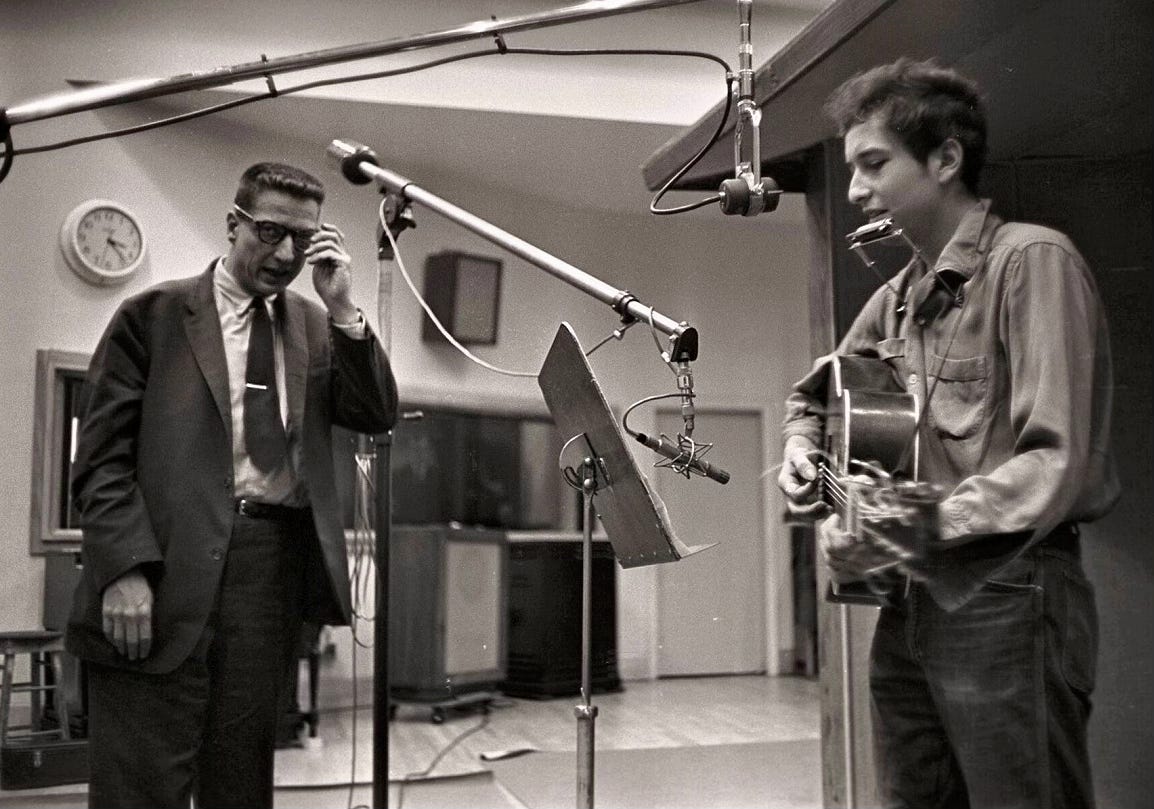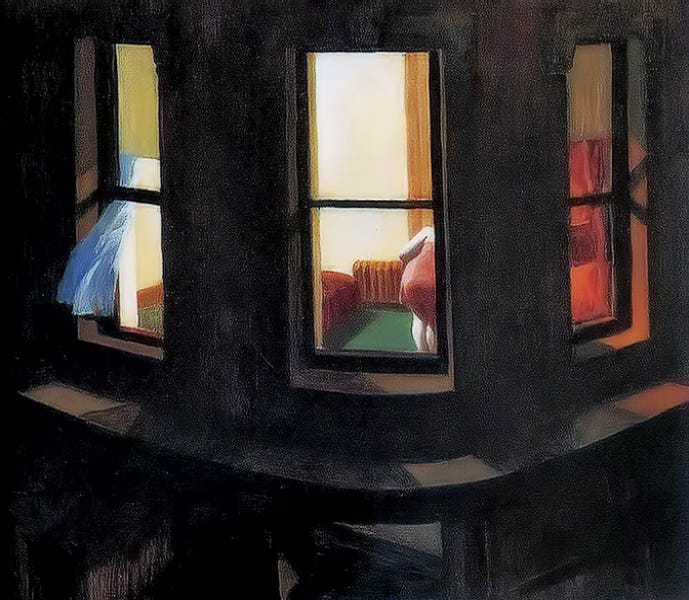Mahalia Jackson — “The Queen of Gospel Music” — was born 112 years ago today
Mahalia Jackson backstage at the Newport Jazz Festival, 1957
Photo by Ted Williams
Mahalia Jackson, “The Queen of Gospel Music,” was born 112 years ago today.
Possessing a powerful contralto voice, Jackson was one of the most influential gospel singers in the world and was heralded internationally as a singer and civil rights activist.
She recorded about 30 albums (mostly for Columbia Records) during her career, and her 45 rpm single releases included a dozen million-selling gold records.
Born as Mahala Jackson and nicknamed "Halie,” Jackson grew up in the Black Pearl section of the Carrollton neighborhood of Uptown New Orleans, Louisiana. The three-room dwelling on Pitt Street housed thirteen people and a dog.
When she was born Halie suffered from genu varum, or "bowed legs.” The doctors wanted to perform surgery by breaking her legs, but one of the resident aunts opposed it.
Halie's mother would rub her legs down with greasy dishwater. The condition never stopped young Halie from performing her dance steps for the white woman for whom her mother and Aunt Bell cleaned house. Mahalia was five when her mother Charity died, leaving her family to decide who would raise Halie and her brother. Aunt Duke assumed this responsibility, and the children were forced to work from sunup to sundown.
In 1927, at the age of sixteen, Jackson moved from the south to Chicago in the midst of the Great Migration. After her first Sunday church service, where she had given an impromptu performance of her favorite song, "Hand Me Down My Silver Trumpet, Gabriel," she was invited to join the Greater Salem Baptist Church Choir.
She began touring the city's churches and surrounding areas with the Johnson Gospel Singers, one of the earliest professional gospel groups.
In 1929, Jackson met the composer, Thomas A. Dorsey, known as the Father of Gospel Music. He gave her musical advice, and in the mid-1930s they began a fourteen-year association of touring, with Jackson singing Dorsey's songs in church programs and at conventions. His "Take My Hand, Precious Lord" became her signature song.
In 1936, Jackson married Isaac Lanes Grey Hockenhull ("Ike"), a graduate of Fisk University and Tuskegee Institute, who was 10 years her senior. Though under constant pressure, Mahalia refused to sing secular music, a pledge she would keep throughout her professional life. She divorced Isaac over the issue in 1941.
Jackson played an important role during the civil rights movement. In August, 1956, she met Ralph Abernathy and Martin Luther King, Jr. at the National Baptist Convention. A few months later, both King and Abernathy contacted her about coming to Montgomery, Alabama to sing at a rally to raise money for the bus boycott. They also hoped that she would inspire the people who were getting discouraged with the boycott.
Despite death threats, Jackson agreed to sing in Montgomery on December 6, 1956. By then, the U.S. Supreme Court ruled in Browder vs. Gayle that bus segregation was unconstitutional. In Montgomery, the ruling was not yet put into effect, so the bus boycott continued.
After the concert, when she returned to the Abernathy's home, it was bombed. The boycott finally ended on December 21, 1956 when federal injunctions were served, forcing Montgomery to comply with the court ruling.
Although she was internationally known, she still encountered racial prejudice when trying to buy a home. Everywhere she went, the white owners and real estate agents would turn her away, claiming that houses she wanted to buy had already been sold. When she finally found a house, the neighbors were not happy.
Shots were fired at her windows and she had to contact the police for protection. White families started moving out and black families started moving in. Everything remained the same in her neighborhood except for the skin color of the residents.
From this point forward, she appeared often with Rev. King, singing before his speeches.
When King called on her, she never refused, traveling with him to the deepest parts of the segregated south. She performed “I Been ‘Buked and I Been Scorned” before King gave his speech at the March on Washington for Jobs and Freedom in 1963. She also sang "Precious Lord" at his funeral in 1968.
Jackson died in Chicago on January 27, 1972 of heart failure and diabetes complications.
Here, Jackson performs “Amazing Grace.”
Bootsy Collins, funk bassist, singer and songwriter, is 72 years old today.
Rising to prominence with James Brown in the late 1960s, and with Parliament-Funkadelic in the '70s, Collins's driving bass guitar and humorous vocals established him as one of the leading names in funk.
With his elder brother, Phelps "Catfish" Collins, Frankie "Kash" Waddy and Philippé Wynne, Collins formed a funk band called The Pacemakers in 1968.
In March, 1970, after most of the members of James Brown's band quit over a pay dispute, The Pacemakers were hired as Brown's backing band and they became known as The J.B.'s. They are often referred to as the "original" J.B.'s to distinguish them from later line-ups that went by the same name.
Although they worked for Brown for only 11 months, the original J.B.'s played on some of Brown's most intense funk recordings, including "Get Up (I Feel Like Being a) Sex Machine,” "Bewildered (1970),” "Super Bad,” "Soul Power,” "Talkin' Loud and Sayin' Nothing,” and two instrumental singles, the much-sampled, "The Grunt" and "These Are the J.B.’s.”
After parting ways with Brown, Collins returned to Cincinnati and formed House Guests with his brother, Phelps Collins, as well as Rufus Allen, Clayton "Chicken" Gunnels, Frankie Waddy, Ronnie Greenaway and Robert McCullough.
The House Guests released "What So Never the Dance" and another single on the House Guests label, as well as a third, “The Sound of Vision.”
Next Collins moved to Detroit, after Philippé Wynne suggested joining The Spinners, for whom Wynne had been singing. However, following the advice of singer and future Parliament member Mallia Franklin, Collins had another choice.
Franklin introduced both Collins brothers to George Clinton. In 1972, both of the Collins brothers, along with Waddy, joined Funkadelic. Collins played bass on most of Funkadelic and all of Parliament's albums (with the exception of Osmium) through the early 1980s, garnering several songwriting credits as well.
In 1976, Collins, Catfish, Waddy, Joel Johnson, Gary "Mudbone" Cooper, Robert Johnson and The Horny Horns formed Collin’s Rubber Band, a separate touring unit of Clinton's P-Funk collective. The group recorded five albums together, the first three of which are often considered to be among the quintessential P-Funk recordings.
The group's 1978 album, Bootsy? Player of the Year, reached the top of the R&B album chart and spawned the #1 R&B single, "Bootzilla.” Like Clinton, Collins took on several alter egos, from Casper the Funky Ghost to Bootzilla, "the world's only rhinestone rockstar monster of a doll,” all as parts of the evolving character of an alien rock star who grew gradually more bizarre as time went on (see P-Funk mythology). He also adopted his trademark "space bass" around this time.
In the 90s, Collins collaborated with bluegrass legends Del McCoury, Doc Watson and Mac Wiseman to form the GrooveGrass Boyz. They produced a fusion of bluegrass and funk.
In October, 2010, Collins was awarded a Bass Player Magazine Lifetime Achievement Award at the Key Club in Los Angeles.
In July, 2010, Collins, in partnership with former child actor, Cory Danziger, launched Funk University ("Funk U"), an online-only bass guitar school in which he also serves as curator and lead professor. Funk University offers an intense curriculum tailored for intermediate to advanced bass players as well as anyone interested in a deeper understanding of funk.
Here, Collins performs “Stretchin’ Out.”
Maggie Roche, 1979
Photo by Irene Young
Maggie Roche, a member of the Roches folksinging group, was born 72 years old today.
For Christmas, 1964, 13-year-old Maggie was given a guitar, and the family (also including a third sister, Suzzy, and a brother, David) learned to play folk songs by watching Laura Weber on public television.
As teenagers in the late '60s, Maggie and Terre formed a duo and got their first break when they were signed to Marilyn Lipsius' Coffee House Circuit, an agency that booked acts at colleges.
In 1971, Maggie boldly introduced herself to her songwriting idol, Paul Simon, which led to the duo becoming his protégés and singing backup vocals on "Was a Sunny Day" on his second solo album, There Goes Rhymin' Simon (1973).
They spent two years performing on the college circuit, ending up in San Francisco and falling in with the remnants of the counter culture movement, people whose interests would later be dubbed new age. The duo eventually hitchhiked to Louisiana with a friend involved with the martial arts, staying at what they have described as a "Kung Fu temple" in Hammond.
Returning to the East Coast, they were signed to a production company by Simon, which in turn led to a contract with Simon's label, Columbia Records.
Their debut album, Seductive Reasoning (1975), contained one track produced by Simon, "If You Empty Out All Your Pockets You Could Not Make the Change," and the rest produced by either David Hood and Jimmy Johnson of the Muscle Shoals Sound Rhythm Section (which played on the album) or by Paul Samwell-Smith, a former member of the Yardbirds.
The album's songs, written by Maggie, chronicled the sisters' recent cross-country adventures. The album was positively reviewed, but it did not sell. The sisters abandoned music and went back to Louisiana for a time, working as waitresses while they, as Terre later put it, "sought to discover the key to a harmonious existence."
They returned to New York City in 1976 and, during the holiday season, sang Christmas carols for fun on street corners along with their younger sister, Suzzy. They had enough fun that they began to rehearse seriously as a trio. By this time, Maggie and Terre were working as bartenders at the famed Greenwich Village club, Folk City, and soon the trio, calling themselves the Roches, were on-stage there.
With the addition of the more outgoing and overtly comical, Suzzy, and with all three sisters writing songs, the Roches were a distinctly different act from Maggie and Terre Roche. They caught on in 1979, releasing the first of what would be ten albums that tended to follow the pattern of Seductive Reasoning, earning critical kudos but negligible sales.
On January 21, 2017, Maggie Roche died of cancer at the age of 65.
Here the Roches perform “Everything is Good” in 1989.
On this day in 1881 — 142 years ago — the Earp brothers faced off against the Clanton-McLaury gang in the legendary shootout at the OK Corral in Tombstone, Arizona.
After silver was discovered nearby in 1877, Tombstone quickly grew into one of the richest mining towns in the Southwest. Wyatt Earp, a former Kansas police officer working as a bank security guard, and his brothers, Morgan and Virgil, the town marshal, represented "law and order" in Tombstone, though they also had reputations as being power-hungry and ruthless.
The Clantons and McLaurys were cowboys who lived on a ranch outside of town and sidelined as cattle rustlers, thieves and murderers.
In October, 1881, the struggle between these two groups for control of Tombstone and Cochise County ended in a blaze of gunfire at the OK Corral.
On the morning of October 25, Ike Clanton and Tom McLaury came into Tombstone for supplies. Over the next 24 hours, the two men had several violent run-ins with the Earps and their friend, Doc Holliday. Around 1:30 p.m. on October 26, Ike's brother, Billy, rode into town to join them, along with Frank McLaury and Billy Claiborne.
The first person they met in the local saloon was Holliday, who was delighted to inform them that their brothers had both been pistol-whipped by the Earps. Frank and Billy immediately left the saloon, vowing revenge.
Around 3 p.m., the Earps and Holliday spotted the five members of the Clanton-McLaury gang in a vacant lot behind the OK Corral, at the end of Fremont Street.
The famous gunfight that ensued lasted all of 30 seconds, and around 30 shots were fired. Though it's still debated who fired the first shot, most reports say that the shootout began when Virgil Earp pulled out his revolver and shot Billy Clanton point-blank in the chest, while Doc Holliday fired a shotgun blast at Tom McLaury's chest.
Though Wyatt Earp wounded Frank McLaury with a shot in the stomach, Frank managed to get off a few shots before collapsing, as did Billy Clanton.
When the dust cleared, Billy Clanton and the McLaury brothers were dead, and Virgil and Morgan Earp and Doc Holliday were wounded. Ike Clanton and Claiborne had run for the hills.
Sheriff John Behan of Cochise County, who witnessed the shootout, charged the Earps and Holliday with murder. A month later, however, a Tombstone judge found the men not guilty, ruling that they were "fully justified in committing these homicides."
The famous shootout has been immortalized in many movies, including Frontier Marshal (1939), Gunfight at the OK Corral (1957), Tombstone (1993) and Wyatt Earp (1994).
Pat Conroy
Photo by David G. Spielman
Writer Pat Conroy was born 78 years ago today.
Conroy wrote several acclaimed novels and memoirs. Two of his novels, The Prince of Tides and The Great Santini, were made into Oscar-nominated films. He is recognized as a leading figure of late-20th century Southern literature.
Born in Atlanta, he was the eldest of seven children (five boys and two girls) born to Marine Colonel Donald Conroy, of Chicago, Illinois and the former Frances "Peggy" Peek of Alabama. His father was a Marine Corps fighter pilot, and Conroy moved often in his youth, attending eleven schools by the time he was 15.
He never had a hometown until his family settled in Beaufort, South Carolina, where he finished high school. His alma mater was The Citadel, a military college in South Carolina. His experiences at the military school provided the basis for two of his best-known works, the novel, The Lords of Discipline, and the memoir, My Losing Season.
Conroy has said his stories were heavily influenced by his military brat upbringing, and in particular, difficulties experienced with his own father, a U.S. Marine Corps pilot, who was physically and emotionally abusive toward his children. The pain of a youth growing up in such a harsh environment is evident in Conroy's novels, particularly The Great Santini.
On February 15, 2016, Conroy said he was being treated for pancreatic cancer. He died on March 4, 2016 at the age of 70.
Bob Dylan signed with Columbia Records 62 years ago today
Dylan with John Hammond at the studio
On this day in 1970 — 53 years ago — a wake was held at the Lion's Share in San Anselmo, California to celebrate the life of Janis Joplin.
The singer, who died of an accidental drugs overdose, had left $2,500 in her will to throw a wake party in the event of her demise. The party was attended by her sister, Laura, and Joplin's close friends.
Brownies laced with hashish were unknowingly passed around amongst the guests. Joplin was cremated in the Pierce Brothers Westwood Village Mortuary in Los Angeles.
Her ashes were scattered from a plane into the Pacific Ocean and along Stinson Beach.
Night Windows, 1928
Painting by Edward Hopper
This painting is in the Museum of Modern Art in New York City










